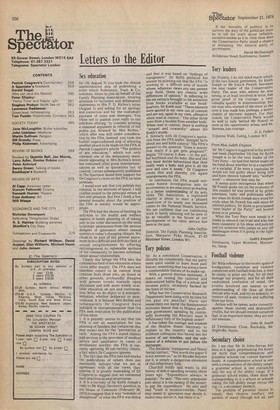Secondary choice
Sir: 1 see that Mr St John-Stevas has been at it again, perpetuating the hoary old myth that comprehensives and grammar schools can coexist harmoniously. A comprehensive school is one with a cross-section of the ability range; a grammar school is one containing only the top of the ability range. If a grammar school exists, there must be corresponding to it a school or schools taking the full ability range minus the top, i.e. a secondary modern.
The problem of parental choice is, simply, that choices conflict: the parents of many (though not all, and
Perhaps not even a majority) of the Pupils of the top ability range want grammar schools, while nearly all the others (i.e. roughly 80 per cent of the total) want comprehensive schools. Almost no one I know wants a secondary modern education for his Child : and this type is an inevitable concomitant of grammar education for the top few. So if a majority of parents do not want the grammar-cum-secon-. dary modern system, the only way of Pleasing the majority is to provide comprehensives: in this way a majority, rather than a minority, will have the type of school of their choice.
Within a comprehensive system there Is considerable variety, not a dull uniformity. In academic work there may be streaming, setting, or mixed ability work or any combination of them; personally I am conservative enough to favour setting or streaming for older age groups, but no one can say there is no variety of choice. Again in Pastoral care, we can have the Year Group as the basic unit as I personally Prefer, so as to keep pupils in their natural age-groupings; or a House System; or an extension of the House Idea so that the Form is also a family unit of mixed age groups; once more there's plenty of choice. Yet again, we CS n have coeducational or single-sex comprehensives (though I wish more Parents knew how the results of educational research favour coeducation). Even this doesn't exhaust thepossibilities: therecan benodenom in ational or Local Authority schools; boarding or day; and of course there can be an eleven-eighteen age range: or eleven-sixteen followed by Sixth Form College; or three-tier thirteen-eighteen schools. Again being conservative, I like the small schools like my own of 700 With a personal touch as is afforded by the three-tier thirteen-eighteen age range system. But the point I really wish to make is that the mind boggles at the number of different types that are Possible. And even among a group of schools of the same type, each will have its own special excellence: one in Russian, one in geology, one in home economics, and so on.
Parents should be given the fullest information about the schools in their area so that they can make a meaningful Choice. In a good system parents will sometimes choose a school because of family connections, sometimes for a Particular excellence in say foreign 1allguages, and often siniRly because it 15 the nearest. Provided that all the schools are of a high level, a strong link between a school and the neighbourhood is no bad thing — among other things it cuts out time, energy, and money consuming travelling: but it is essential that the schools in the poorer areas should have extra help to compensate for the disadvantage of the district. Given this, we really shall have equality of opportunity for all pupils to taste excellence.
Bernarr Atherton 10 Carleton Avenue Wallington, Surrey



































 Previous page
Previous page